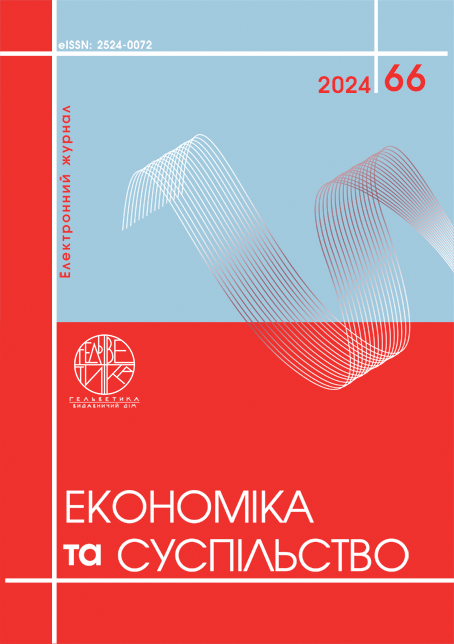CHARACTERISTICS OF THE DIGITAL TRANSFORMATION OF THE ECONOMY IN THE CONTEXT OF GLOBAL CHALLENGES
Abstract
The article focuses on an in-depth study of digital transformation’s profound impact on the modern economy, particularly on its business processes and socio-economic systems. In today’s rapidly changing technological environment, key innovative technologies such as artificial intelligence, blockchain, the Internet of Things, and big data are pivotal in transforming traditional industries. These technologies are reshaping existing sectors and creating new opportunities for growth and development across various industries. The article provides a comprehensive analysis of the advantages offered by the digital economy, including significant improvements in productivity, operational efficiency, and the expansion of access to global markets. Additionally, it highlights how digitalization allows businesses to streamline processes, reduce costs, and increase their competitiveness on a global scale. The article also draws attention to the challenges posed by the rapid adoption of digital technologies, particularly concerning cybersecurity risks and the protection of personal data. These issues have become more pressing as digital technologies permeate all areas of economic activity, making the need for secure digital infrastructures more urgent. A critical issue raised in the article is the insufficient development of digital infrastructure in Ukraine, which has slowed the country’s pace of digital transformation and has become a barrier to full integration into the global digital economy. The article explores the prospects of digital technology development in Ukraine within the framework of international digitization initiatives, such as the European Union’s "Digital Europe" program. In particular, the study emphasizes the importance of making substantial investments in digital infrastructure, enhancing the digital competencies of the population, and safeguarding digital rights. A comprehensive approach to digital transformation is essential for the modernization of all sectors of the economy, ensuring more sustainable growth and greater global competitiveness for Ukraine. By integrating into the global digital space, Ukraine can better position itself as an important player in the global economy of the future.
References
Цифрова планета 2017. Як конкурентоспроможність та довіра до цифрових економік відрізняються в різних країнах світу. URL: https://digitalplanet.tufts.edu/wp-content/uploads/2023/09/Digital_Planet_2017_FINAL.pdf
Група Світового банку (2016). Цифрові дивіденди. URL: https://openknowledge.worldbank.org/bitstream/handle/10986/23347/9781464806711.pdf
Климчук M. Методологія управління інвестиційними процесами цифровизації економіки. Innovation and sustainability. 2022. № 1. С. 20–33.
Мельничук Г. С., Мамалига В. О. Цифровізація економіки: можливості та загрози для ефективного функціонування підприємств. Приазовський економічний вісник. 2020. № 2(19). C 125-130.
Гавриленко Н. Г., Тарасенко І. О. Сучасні тенденції цифровізації економіки: проблеми та перспективи розвитку. Міжнародний науковий журнал "Інтернаука". Серія: "Економічні науки". 2021. № 3(47). C 36-46.
Миронова М. І. Аналіз розвитку цифрової економіки у світі та в Україні. Наукового товариства ім. Шевченка. Економічний збірник. 2022. №68. С. 93–101.
Питання та відповіді: Індекс цифрової економіки та суспільства (DESI) 2022. URL: https://ec.europa.eu/commission/presscorner/detail/en/qanda_22_4561
Федорак В. Як взяти участь у Програмі «Цифрова Європа». URL: https://u-lead.org.ua/news/112
Digital planet 2017. How competitiveness and trust in digital economies vary across the world. Available at: https://digitalplanet.tufts.edu/wp-content/uploads/2023/09/Digital_Planet_2017_FINAL.pdf
World Bank Group (2016). Digital Dividends. Available at: https://openknowledge.worldbank.org/bitstream/handle/10986/23347/9781464806711.pdf
Klymchuk M. (2022) Metodolohiia upravlinnia investytsiinymy protsesamy tsyfrovyzatsii ekonomiky [Methodology for managing investment processes of digitalization of the economy]. Innovation and sustainability, vol. 1. pp. 20–33.
Melnichuk A., Mamaliga V. (2020) Tsyfrovizatsiia ekonomiky: mozhlyvosti ta zahrozy dlia efektyvnoho funktsionuvannia pidpryiemstv [Digitalization of the economy: opportunities and threats for efficient functioning of enterprises]. Pryazovskyi ekonomichnyi visnyk - Pryazovskyi Economic Herald, vol. 2(19), pp. 125-130.
Havrylenko N., Tarasenko I. (2017) Suchasni tendentsii tsyfrovizatsii ekonomiky: problemy ta perspektyvy rozvytku. [Current trends of digitalization of the economy: problems and prospects of development]. Mizhnarodnyi naukovyi zhurnal "Internauka". Seriia: "Ekonomichni nauky" - International scientific journal "Internauka". Series: "Economic Sciences", vol. 3(47), pp. 36-46.
Myronova M. (2022) Suchasni tendentsii tsyfrovizatsii ekonomiky: problemy ta perspektyvy rozvytku. [Analysis of the development of the digital economy in the world and in Ukraine]. Mizhnarodnyi naukovyi zhurnal "Internauka". Seriia: "Ekonomichni nauky" - Shevchenko Scientific Society. Economic collection, vol. 68, pp. 93–101.
Questions and Answers: Digital Economy and Society Index (DESI) 2022. Available at: https://ec.europa.eu/commission/presscorner/detail/en/qanda_22_4561
Fedorak V. Yak vziaty uchast u Prohrami «Tsyfrova Yevropa» [How to participate in the «Digital Europe» programme]. Available at: https://u-lead.org.ua/news/112

This work is licensed under a Creative Commons Attribution 4.0 International License.


